Cultural Values in Business: A Comparative Study of China and Malaysia
VerifiedAdded on 2020/05/04
|10
|3131
|74
AI Summary
The document examines the role of culture and historical background in shaping the business processes within two countries: China and Malaysia. Despite both nations belonging to the broader Asian context, their unique cultural values and moral behaviors distinctly influence their respective business environments. In China, 'guanxi'—the intricate web of personal connections and relationships—is a fundamental aspect that drives business interactions and decision-making processes. This concept underscores the importance of relationship-building in Chinese business culture, often determining the success or failure of business endeavors. Conversely, Malaysian business practices are influenced by a blend of cultural values stemming from its diverse ethnic composition, including Malay, Chinese, Indian, and indigenous communities. This diversity fosters a multifaceted business landscape where various moral behaviors coexist and interact. The analysis underscores that these cultural differences not only reflect in the distinct ways businesses operate but also highlight how historical backgrounds have contributed to shaping these practices. It suggests that understanding these nuanced cultural dimensions is crucial for international companies aiming to succeed in either country, as it affects everything from negotiation styles to management strategies and corporate social responsibilities.
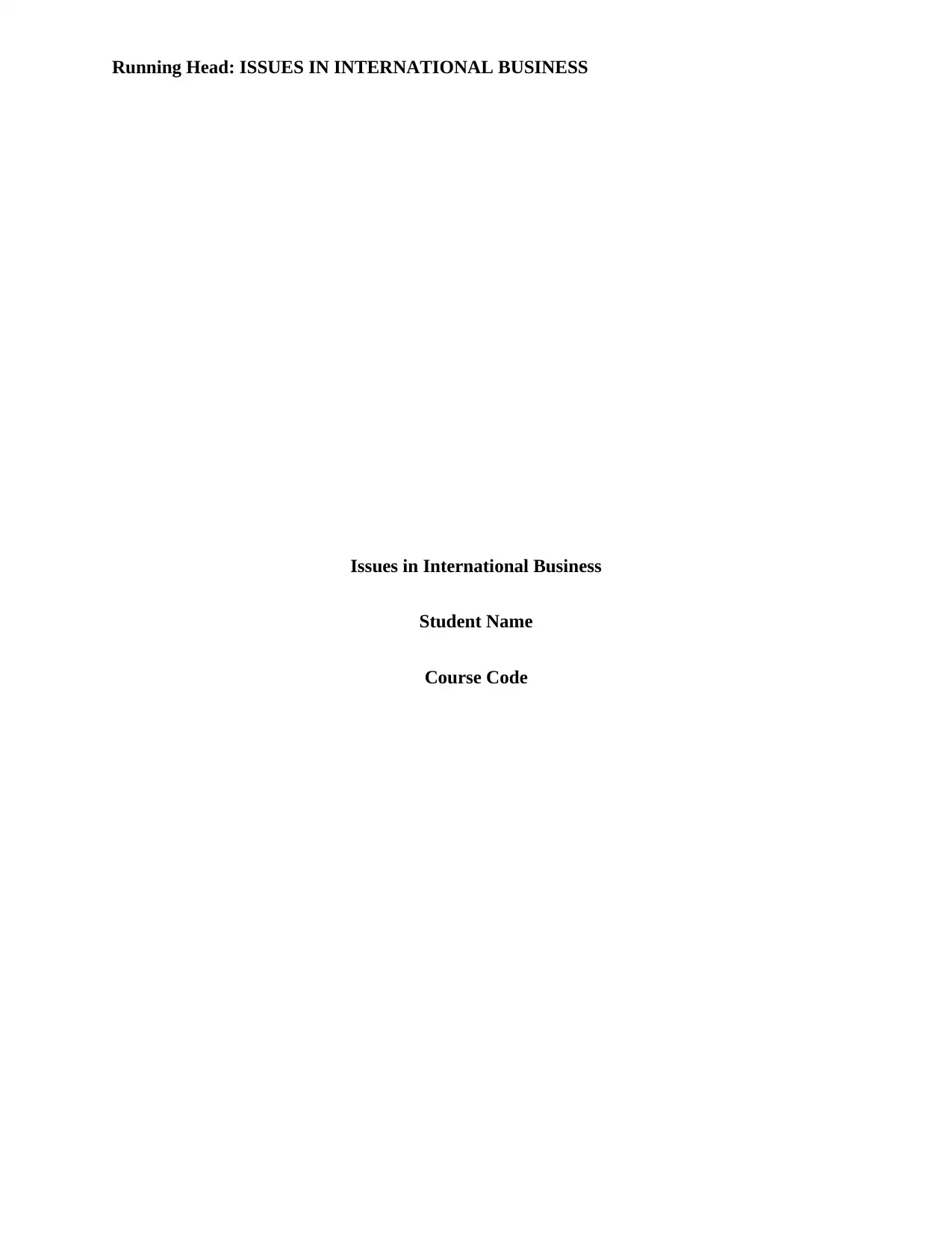
Running Head: ISSUES IN INTERNATIONAL BUSINESS
Issues in International Business
Student Name
Course Code
Issues in International Business
Student Name
Course Code
Paraphrase This Document
Need a fresh take? Get an instant paraphrase of this document with our AI Paraphraser
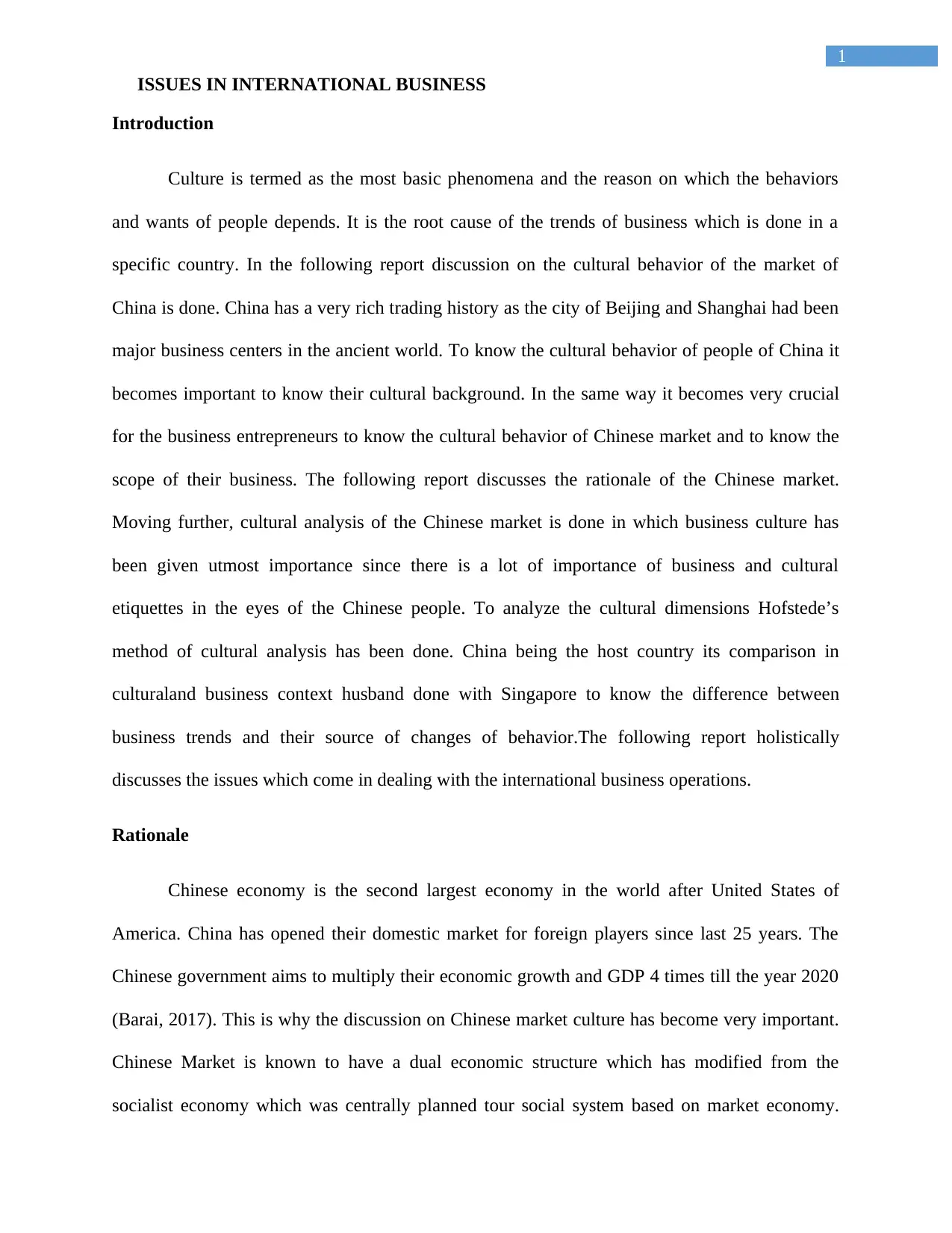
1
ISSUES IN INTERNATIONAL BUSINESS
Introduction
Culture is termed as the most basic phenomena and the reason on which the behaviors
and wants of people depends. It is the root cause of the trends of business which is done in a
specific country. In the following report discussion on the cultural behavior of the market of
China is done. China has a very rich trading history as the city of Beijing and Shanghai had been
major business centers in the ancient world. To know the cultural behavior of people of China it
becomes important to know their cultural background. In the same way it becomes very crucial
for the business entrepreneurs to know the cultural behavior of Chinese market and to know the
scope of their business. The following report discusses the rationale of the Chinese market.
Moving further, cultural analysis of the Chinese market is done in which business culture has
been given utmost importance since there is a lot of importance of business and cultural
etiquettes in the eyes of the Chinese people. To analyze the cultural dimensions Hofstede’s
method of cultural analysis has been done. China being the host country its comparison in
culturaland business context husband done with Singapore to know the difference between
business trends and their source of changes of behavior.The following report holistically
discusses the issues which come in dealing with the international business operations.
Rationale
Chinese economy is the second largest economy in the world after United States of
America. China has opened their domestic market for foreign players since last 25 years. The
Chinese government aims to multiply their economic growth and GDP 4 times till the year 2020
(Barai, 2017). This is why the discussion on Chinese market culture has become very important.
Chinese Market is known to have a dual economic structure which has modified from the
socialist economy which was centrally planned tour social system based on market economy.
ISSUES IN INTERNATIONAL BUSINESS
Introduction
Culture is termed as the most basic phenomena and the reason on which the behaviors
and wants of people depends. It is the root cause of the trends of business which is done in a
specific country. In the following report discussion on the cultural behavior of the market of
China is done. China has a very rich trading history as the city of Beijing and Shanghai had been
major business centers in the ancient world. To know the cultural behavior of people of China it
becomes important to know their cultural background. In the same way it becomes very crucial
for the business entrepreneurs to know the cultural behavior of Chinese market and to know the
scope of their business. The following report discusses the rationale of the Chinese market.
Moving further, cultural analysis of the Chinese market is done in which business culture has
been given utmost importance since there is a lot of importance of business and cultural
etiquettes in the eyes of the Chinese people. To analyze the cultural dimensions Hofstede’s
method of cultural analysis has been done. China being the host country its comparison in
culturaland business context husband done with Singapore to know the difference between
business trends and their source of changes of behavior.The following report holistically
discusses the issues which come in dealing with the international business operations.
Rationale
Chinese economy is the second largest economy in the world after United States of
America. China has opened their domestic market for foreign players since last 25 years. The
Chinese government aims to multiply their economic growth and GDP 4 times till the year 2020
(Barai, 2017). This is why the discussion on Chinese market culture has become very important.
Chinese Market is known to have a dual economic structure which has modified from the
socialist economy which was centrally planned tour social system based on market economy.
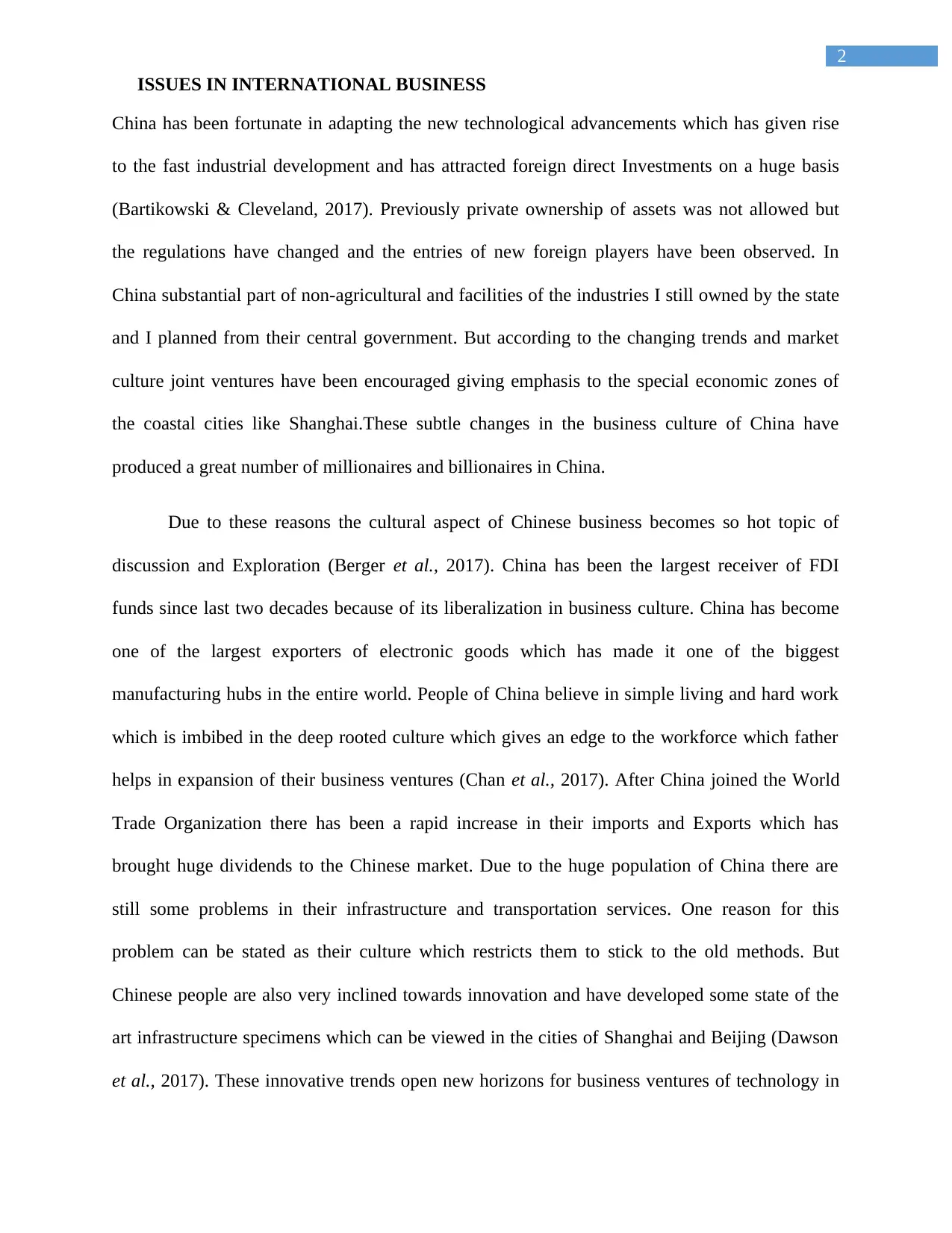
2
ISSUES IN INTERNATIONAL BUSINESS
China has been fortunate in adapting the new technological advancements which has given rise
to the fast industrial development and has attracted foreign direct Investments on a huge basis
(Bartikowski & Cleveland, 2017). Previously private ownership of assets was not allowed but
the regulations have changed and the entries of new foreign players have been observed. In
China substantial part of non-agricultural and facilities of the industries I still owned by the state
and I planned from their central government. But according to the changing trends and market
culture joint ventures have been encouraged giving emphasis to the special economic zones of
the coastal cities like Shanghai.These subtle changes in the business culture of China have
produced a great number of millionaires and billionaires in China.
Due to these reasons the cultural aspect of Chinese business becomes so hot topic of
discussion and Exploration (Berger et al., 2017). China has been the largest receiver of FDI
funds since last two decades because of its liberalization in business culture. China has become
one of the largest exporters of electronic goods which has made it one of the biggest
manufacturing hubs in the entire world. People of China believe in simple living and hard work
which is imbibed in the deep rooted culture which gives an edge to the workforce which father
helps in expansion of their business ventures (Chan et al., 2017). After China joined the World
Trade Organization there has been a rapid increase in their imports and Exports which has
brought huge dividends to the Chinese market. Due to the huge population of China there are
still some problems in their infrastructure and transportation services. One reason for this
problem can be stated as their culture which restricts them to stick to the old methods. But
Chinese people are also very inclined towards innovation and have developed some state of the
art infrastructure specimens which can be viewed in the cities of Shanghai and Beijing (Dawson
et al., 2017). These innovative trends open new horizons for business ventures of technology in
ISSUES IN INTERNATIONAL BUSINESS
China has been fortunate in adapting the new technological advancements which has given rise
to the fast industrial development and has attracted foreign direct Investments on a huge basis
(Bartikowski & Cleveland, 2017). Previously private ownership of assets was not allowed but
the regulations have changed and the entries of new foreign players have been observed. In
China substantial part of non-agricultural and facilities of the industries I still owned by the state
and I planned from their central government. But according to the changing trends and market
culture joint ventures have been encouraged giving emphasis to the special economic zones of
the coastal cities like Shanghai.These subtle changes in the business culture of China have
produced a great number of millionaires and billionaires in China.
Due to these reasons the cultural aspect of Chinese business becomes so hot topic of
discussion and Exploration (Berger et al., 2017). China has been the largest receiver of FDI
funds since last two decades because of its liberalization in business culture. China has become
one of the largest exporters of electronic goods which has made it one of the biggest
manufacturing hubs in the entire world. People of China believe in simple living and hard work
which is imbibed in the deep rooted culture which gives an edge to the workforce which father
helps in expansion of their business ventures (Chan et al., 2017). After China joined the World
Trade Organization there has been a rapid increase in their imports and Exports which has
brought huge dividends to the Chinese market. Due to the huge population of China there are
still some problems in their infrastructure and transportation services. One reason for this
problem can be stated as their culture which restricts them to stick to the old methods. But
Chinese people are also very inclined towards innovation and have developed some state of the
art infrastructure specimens which can be viewed in the cities of Shanghai and Beijing (Dawson
et al., 2017). These innovative trends open new horizons for business ventures of technology in
⊘ This is a preview!⊘
Do you want full access?
Subscribe today to unlock all pages.

Trusted by 1+ million students worldwide
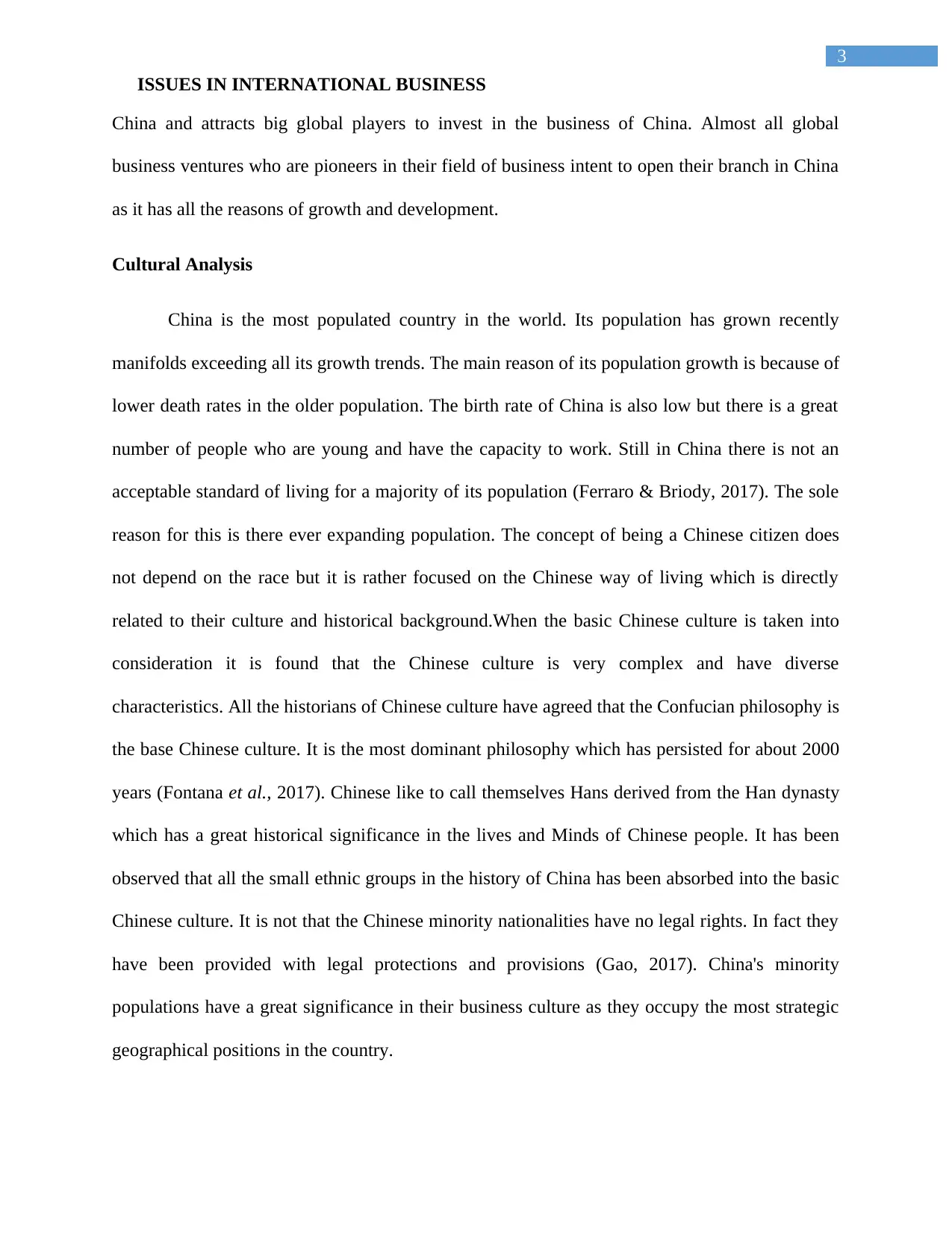
3
ISSUES IN INTERNATIONAL BUSINESS
China and attracts big global players to invest in the business of China. Almost all global
business ventures who are pioneers in their field of business intent to open their branch in China
as it has all the reasons of growth and development.
Cultural Analysis
China is the most populated country in the world. Its population has grown recently
manifolds exceeding all its growth trends. The main reason of its population growth is because of
lower death rates in the older population. The birth rate of China is also low but there is a great
number of people who are young and have the capacity to work. Still in China there is not an
acceptable standard of living for a majority of its population (Ferraro & Briody, 2017). The sole
reason for this is there ever expanding population. The concept of being a Chinese citizen does
not depend on the race but it is rather focused on the Chinese way of living which is directly
related to their culture and historical background.When the basic Chinese culture is taken into
consideration it is found that the Chinese culture is very complex and have diverse
characteristics. All the historians of Chinese culture have agreed that the Confucian philosophy is
the base Chinese culture. It is the most dominant philosophy which has persisted for about 2000
years (Fontana et al., 2017). Chinese like to call themselves Hans derived from the Han dynasty
which has a great historical significance in the lives and Minds of Chinese people. It has been
observed that all the small ethnic groups in the history of China has been absorbed into the basic
Chinese culture. It is not that the Chinese minority nationalities have no legal rights. In fact they
have been provided with legal protections and provisions (Gao, 2017). China's minority
populations have a great significance in their business culture as they occupy the most strategic
geographical positions in the country.
ISSUES IN INTERNATIONAL BUSINESS
China and attracts big global players to invest in the business of China. Almost all global
business ventures who are pioneers in their field of business intent to open their branch in China
as it has all the reasons of growth and development.
Cultural Analysis
China is the most populated country in the world. Its population has grown recently
manifolds exceeding all its growth trends. The main reason of its population growth is because of
lower death rates in the older population. The birth rate of China is also low but there is a great
number of people who are young and have the capacity to work. Still in China there is not an
acceptable standard of living for a majority of its population (Ferraro & Briody, 2017). The sole
reason for this is there ever expanding population. The concept of being a Chinese citizen does
not depend on the race but it is rather focused on the Chinese way of living which is directly
related to their culture and historical background.When the basic Chinese culture is taken into
consideration it is found that the Chinese culture is very complex and have diverse
characteristics. All the historians of Chinese culture have agreed that the Confucian philosophy is
the base Chinese culture. It is the most dominant philosophy which has persisted for about 2000
years (Fontana et al., 2017). Chinese like to call themselves Hans derived from the Han dynasty
which has a great historical significance in the lives and Minds of Chinese people. It has been
observed that all the small ethnic groups in the history of China has been absorbed into the basic
Chinese culture. It is not that the Chinese minority nationalities have no legal rights. In fact they
have been provided with legal protections and provisions (Gao, 2017). China's minority
populations have a great significance in their business culture as they occupy the most strategic
geographical positions in the country.
Paraphrase This Document
Need a fresh take? Get an instant paraphrase of this document with our AI Paraphraser
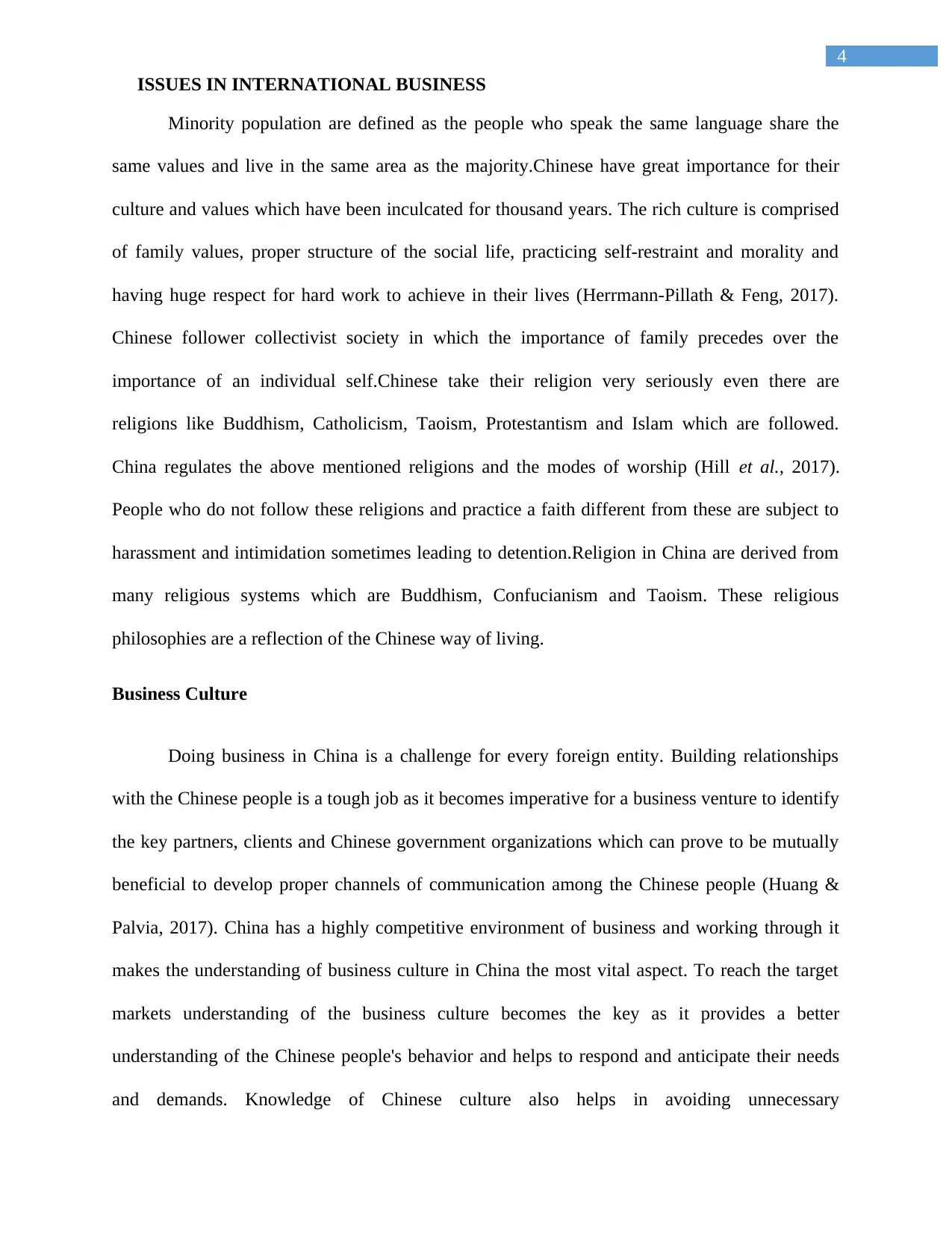
4
ISSUES IN INTERNATIONAL BUSINESS
Minority population are defined as the people who speak the same language share the
same values and live in the same area as the majority.Chinese have great importance for their
culture and values which have been inculcated for thousand years. The rich culture is comprised
of family values, proper structure of the social life, practicing self-restraint and morality and
having huge respect for hard work to achieve in their lives (Herrmann-Pillath & Feng, 2017).
Chinese follower collectivist society in which the importance of family precedes over the
importance of an individual self.Chinese take their religion very seriously even there are
religions like Buddhism, Catholicism, Taoism, Protestantism and Islam which are followed.
China regulates the above mentioned religions and the modes of worship (Hill et al., 2017).
People who do not follow these religions and practice a faith different from these are subject to
harassment and intimidation sometimes leading to detention.Religion in China are derived from
many religious systems which are Buddhism, Confucianism and Taoism. These religious
philosophies are a reflection of the Chinese way of living.
Business Culture
Doing business in China is a challenge for every foreign entity. Building relationships
with the Chinese people is a tough job as it becomes imperative for a business venture to identify
the key partners, clients and Chinese government organizations which can prove to be mutually
beneficial to develop proper channels of communication among the Chinese people (Huang &
Palvia, 2017). China has a highly competitive environment of business and working through it
makes the understanding of business culture in China the most vital aspect. To reach the target
markets understanding of the business culture becomes the key as it provides a better
understanding of the Chinese people's behavior and helps to respond and anticipate their needs
and demands. Knowledge of Chinese culture also helps in avoiding unnecessary
ISSUES IN INTERNATIONAL BUSINESS
Minority population are defined as the people who speak the same language share the
same values and live in the same area as the majority.Chinese have great importance for their
culture and values which have been inculcated for thousand years. The rich culture is comprised
of family values, proper structure of the social life, practicing self-restraint and morality and
having huge respect for hard work to achieve in their lives (Herrmann-Pillath & Feng, 2017).
Chinese follower collectivist society in which the importance of family precedes over the
importance of an individual self.Chinese take their religion very seriously even there are
religions like Buddhism, Catholicism, Taoism, Protestantism and Islam which are followed.
China regulates the above mentioned religions and the modes of worship (Hill et al., 2017).
People who do not follow these religions and practice a faith different from these are subject to
harassment and intimidation sometimes leading to detention.Religion in China are derived from
many religious systems which are Buddhism, Confucianism and Taoism. These religious
philosophies are a reflection of the Chinese way of living.
Business Culture
Doing business in China is a challenge for every foreign entity. Building relationships
with the Chinese people is a tough job as it becomes imperative for a business venture to identify
the key partners, clients and Chinese government organizations which can prove to be mutually
beneficial to develop proper channels of communication among the Chinese people (Huang &
Palvia, 2017). China has a highly competitive environment of business and working through it
makes the understanding of business culture in China the most vital aspect. To reach the target
markets understanding of the business culture becomes the key as it provides a better
understanding of the Chinese people's behavior and helps to respond and anticipate their needs
and demands. Knowledge of Chinese culture also helps in avoiding unnecessary
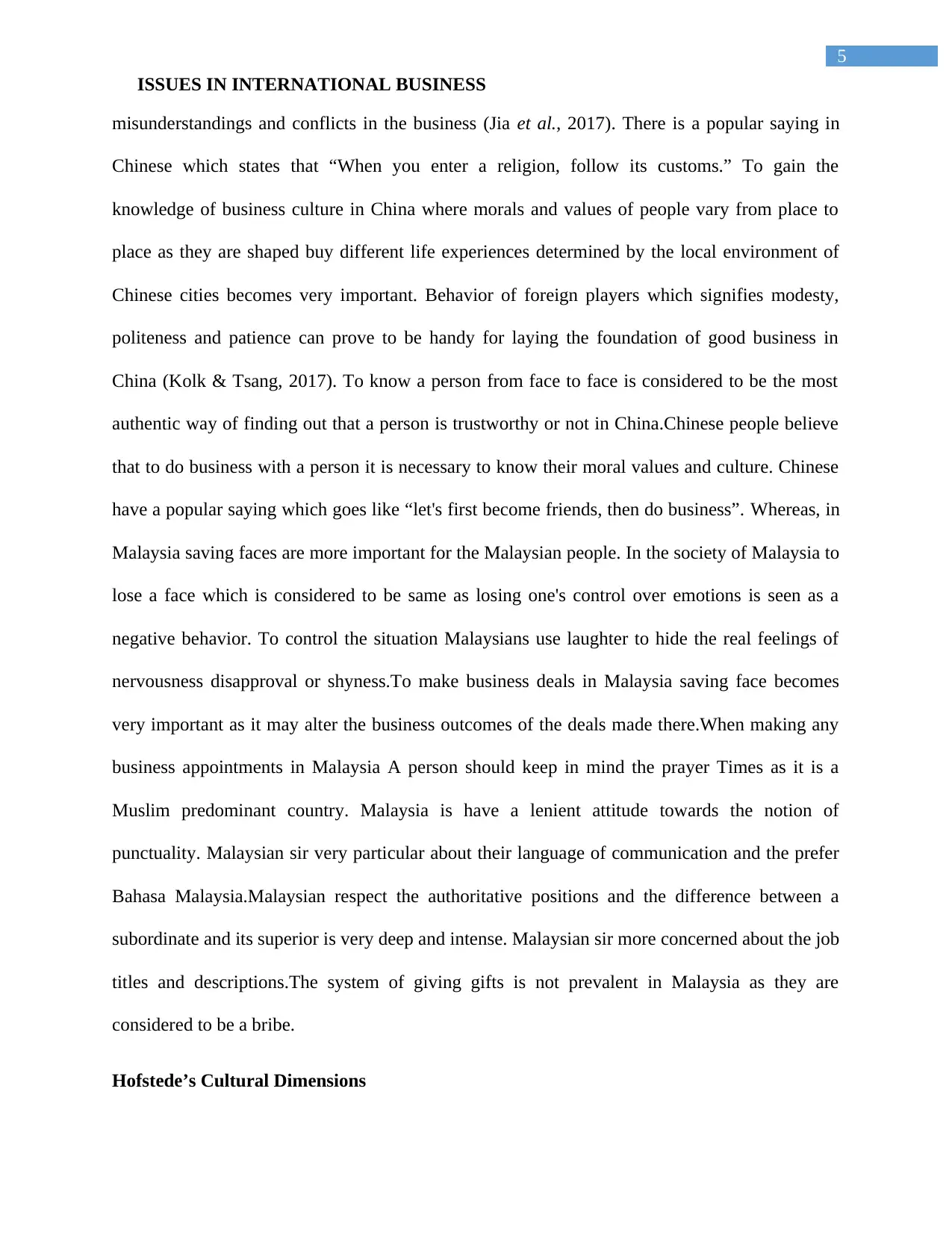
5
ISSUES IN INTERNATIONAL BUSINESS
misunderstandings and conflicts in the business (Jia et al., 2017). There is a popular saying in
Chinese which states that “When you enter a religion, follow its customs.” To gain the
knowledge of business culture in China where morals and values of people vary from place to
place as they are shaped buy different life experiences determined by the local environment of
Chinese cities becomes very important. Behavior of foreign players which signifies modesty,
politeness and patience can prove to be handy for laying the foundation of good business in
China (Kolk & Tsang, 2017). To know a person from face to face is considered to be the most
authentic way of finding out that a person is trustworthy or not in China.Chinese people believe
that to do business with a person it is necessary to know their moral values and culture. Chinese
have a popular saying which goes like “let's first become friends, then do business”. Whereas, in
Malaysia saving faces are more important for the Malaysian people. In the society of Malaysia to
lose a face which is considered to be same as losing one's control over emotions is seen as a
negative behavior. To control the situation Malaysians use laughter to hide the real feelings of
nervousness disapproval or shyness.To make business deals in Malaysia saving face becomes
very important as it may alter the business outcomes of the deals made there.When making any
business appointments in Malaysia A person should keep in mind the prayer Times as it is a
Muslim predominant country. Malaysia is have a lenient attitude towards the notion of
punctuality. Malaysian sir very particular about their language of communication and the prefer
Bahasa Malaysia.Malaysian respect the authoritative positions and the difference between a
subordinate and its superior is very deep and intense. Malaysian sir more concerned about the job
titles and descriptions.The system of giving gifts is not prevalent in Malaysia as they are
considered to be a bribe.
Hofstede’s Cultural Dimensions
ISSUES IN INTERNATIONAL BUSINESS
misunderstandings and conflicts in the business (Jia et al., 2017). There is a popular saying in
Chinese which states that “When you enter a religion, follow its customs.” To gain the
knowledge of business culture in China where morals and values of people vary from place to
place as they are shaped buy different life experiences determined by the local environment of
Chinese cities becomes very important. Behavior of foreign players which signifies modesty,
politeness and patience can prove to be handy for laying the foundation of good business in
China (Kolk & Tsang, 2017). To know a person from face to face is considered to be the most
authentic way of finding out that a person is trustworthy or not in China.Chinese people believe
that to do business with a person it is necessary to know their moral values and culture. Chinese
have a popular saying which goes like “let's first become friends, then do business”. Whereas, in
Malaysia saving faces are more important for the Malaysian people. In the society of Malaysia to
lose a face which is considered to be same as losing one's control over emotions is seen as a
negative behavior. To control the situation Malaysians use laughter to hide the real feelings of
nervousness disapproval or shyness.To make business deals in Malaysia saving face becomes
very important as it may alter the business outcomes of the deals made there.When making any
business appointments in Malaysia A person should keep in mind the prayer Times as it is a
Muslim predominant country. Malaysia is have a lenient attitude towards the notion of
punctuality. Malaysian sir very particular about their language of communication and the prefer
Bahasa Malaysia.Malaysian respect the authoritative positions and the difference between a
subordinate and its superior is very deep and intense. Malaysian sir more concerned about the job
titles and descriptions.The system of giving gifts is not prevalent in Malaysia as they are
considered to be a bribe.
Hofstede’s Cultural Dimensions
⊘ This is a preview!⊘
Do you want full access?
Subscribe today to unlock all pages.

Trusted by 1+ million students worldwide
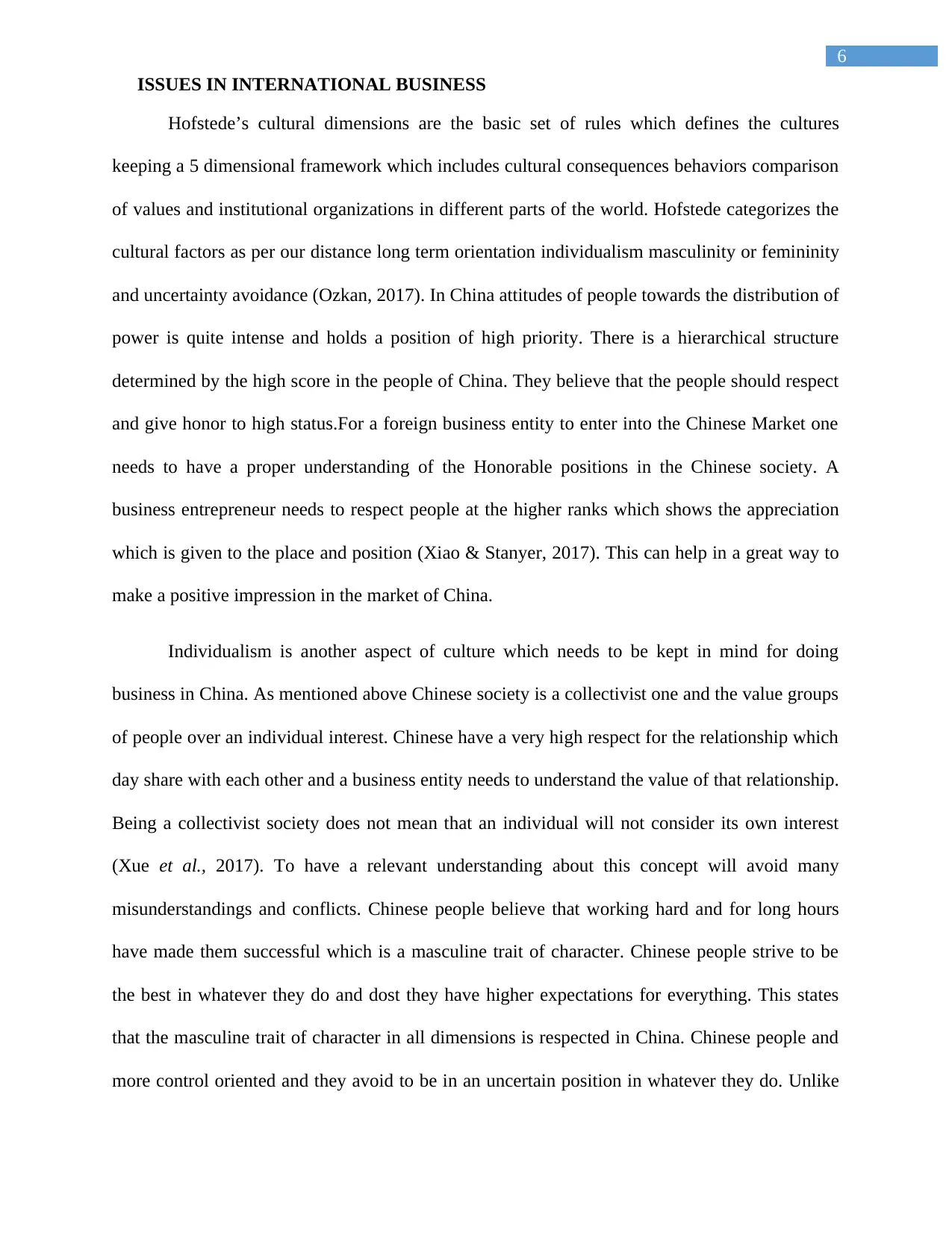
6
ISSUES IN INTERNATIONAL BUSINESS
Hofstede’s cultural dimensions are the basic set of rules which defines the cultures
keeping a 5 dimensional framework which includes cultural consequences behaviors comparison
of values and institutional organizations in different parts of the world. Hofstede categorizes the
cultural factors as per our distance long term orientation individualism masculinity or femininity
and uncertainty avoidance (Ozkan, 2017). In China attitudes of people towards the distribution of
power is quite intense and holds a position of high priority. There is a hierarchical structure
determined by the high score in the people of China. They believe that the people should respect
and give honor to high status.For a foreign business entity to enter into the Chinese Market one
needs to have a proper understanding of the Honorable positions in the Chinese society. A
business entrepreneur needs to respect people at the higher ranks which shows the appreciation
which is given to the place and position (Xiao & Stanyer, 2017). This can help in a great way to
make a positive impression in the market of China.
Individualism is another aspect of culture which needs to be kept in mind for doing
business in China. As mentioned above Chinese society is a collectivist one and the value groups
of people over an individual interest. Chinese have a very high respect for the relationship which
day share with each other and a business entity needs to understand the value of that relationship.
Being a collectivist society does not mean that an individual will not consider its own interest
(Xue et al., 2017). To have a relevant understanding about this concept will avoid many
misunderstandings and conflicts. Chinese people believe that working hard and for long hours
have made them successful which is a masculine trait of character. Chinese people strive to be
the best in whatever they do and dost they have higher expectations for everything. This states
that the masculine trait of character in all dimensions is respected in China. Chinese people and
more control oriented and they avoid to be in an uncertain position in whatever they do. Unlike
ISSUES IN INTERNATIONAL BUSINESS
Hofstede’s cultural dimensions are the basic set of rules which defines the cultures
keeping a 5 dimensional framework which includes cultural consequences behaviors comparison
of values and institutional organizations in different parts of the world. Hofstede categorizes the
cultural factors as per our distance long term orientation individualism masculinity or femininity
and uncertainty avoidance (Ozkan, 2017). In China attitudes of people towards the distribution of
power is quite intense and holds a position of high priority. There is a hierarchical structure
determined by the high score in the people of China. They believe that the people should respect
and give honor to high status.For a foreign business entity to enter into the Chinese Market one
needs to have a proper understanding of the Honorable positions in the Chinese society. A
business entrepreneur needs to respect people at the higher ranks which shows the appreciation
which is given to the place and position (Xiao & Stanyer, 2017). This can help in a great way to
make a positive impression in the market of China.
Individualism is another aspect of culture which needs to be kept in mind for doing
business in China. As mentioned above Chinese society is a collectivist one and the value groups
of people over an individual interest. Chinese have a very high respect for the relationship which
day share with each other and a business entity needs to understand the value of that relationship.
Being a collectivist society does not mean that an individual will not consider its own interest
(Xue et al., 2017). To have a relevant understanding about this concept will avoid many
misunderstandings and conflicts. Chinese people believe that working hard and for long hours
have made them successful which is a masculine trait of character. Chinese people strive to be
the best in whatever they do and dost they have higher expectations for everything. This states
that the masculine trait of character in all dimensions is respected in China. Chinese people and
more control oriented and they avoid to be in an uncertain position in whatever they do. Unlike
Paraphrase This Document
Need a fresh take? Get an instant paraphrase of this document with our AI Paraphraser
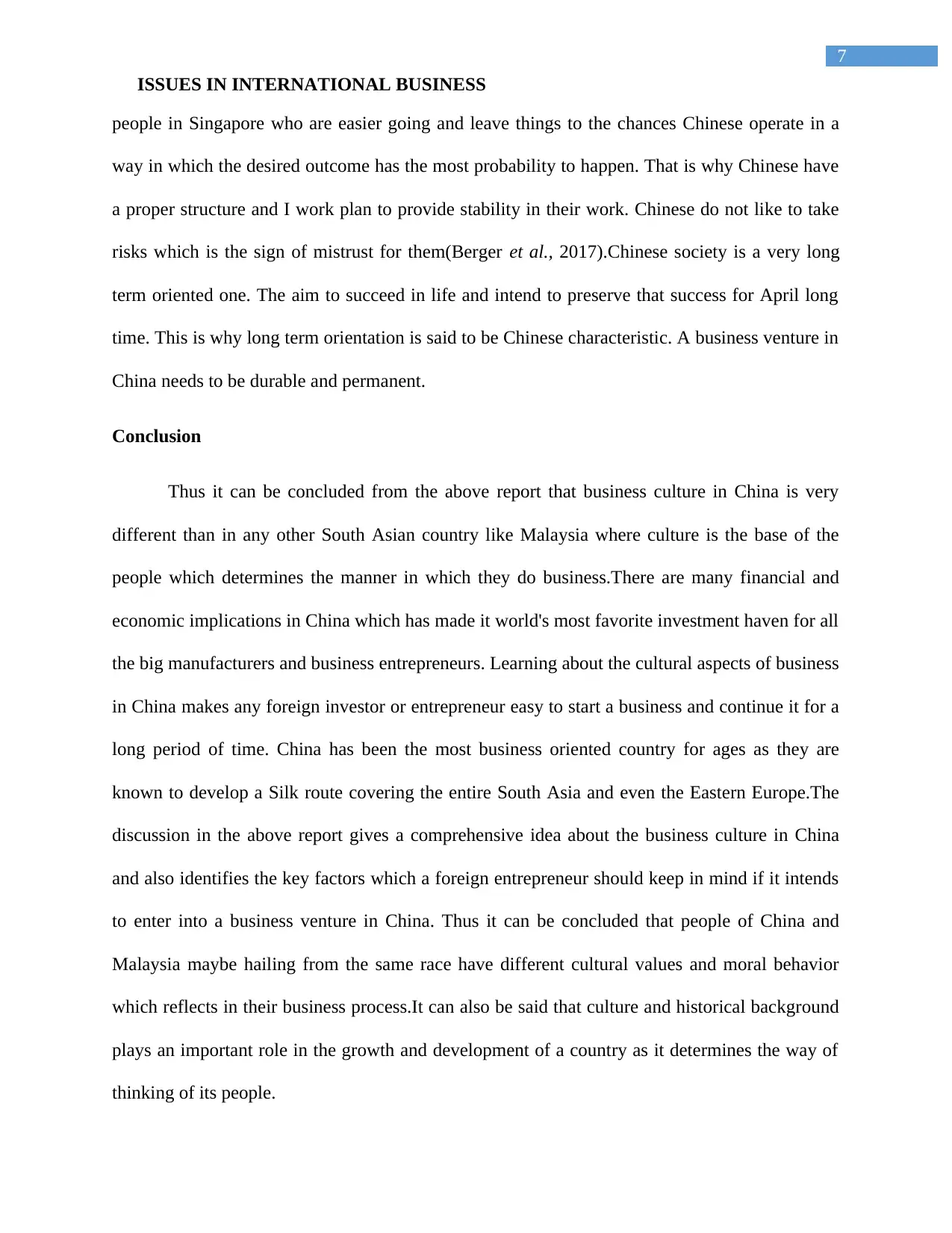
7
ISSUES IN INTERNATIONAL BUSINESS
people in Singapore who are easier going and leave things to the chances Chinese operate in a
way in which the desired outcome has the most probability to happen. That is why Chinese have
a proper structure and I work plan to provide stability in their work. Chinese do not like to take
risks which is the sign of mistrust for them(Berger et al., 2017).Chinese society is a very long
term oriented one. The aim to succeed in life and intend to preserve that success for April long
time. This is why long term orientation is said to be Chinese characteristic. A business venture in
China needs to be durable and permanent.
Conclusion
Thus it can be concluded from the above report that business culture in China is very
different than in any other South Asian country like Malaysia where culture is the base of the
people which determines the manner in which they do business.There are many financial and
economic implications in China which has made it world's most favorite investment haven for all
the big manufacturers and business entrepreneurs. Learning about the cultural aspects of business
in China makes any foreign investor or entrepreneur easy to start a business and continue it for a
long period of time. China has been the most business oriented country for ages as they are
known to develop a Silk route covering the entire South Asia and even the Eastern Europe.The
discussion in the above report gives a comprehensive idea about the business culture in China
and also identifies the key factors which a foreign entrepreneur should keep in mind if it intends
to enter into a business venture in China. Thus it can be concluded that people of China and
Malaysia maybe hailing from the same race have different cultural values and moral behavior
which reflects in their business process.It can also be said that culture and historical background
plays an important role in the growth and development of a country as it determines the way of
thinking of its people.
ISSUES IN INTERNATIONAL BUSINESS
people in Singapore who are easier going and leave things to the chances Chinese operate in a
way in which the desired outcome has the most probability to happen. That is why Chinese have
a proper structure and I work plan to provide stability in their work. Chinese do not like to take
risks which is the sign of mistrust for them(Berger et al., 2017).Chinese society is a very long
term oriented one. The aim to succeed in life and intend to preserve that success for April long
time. This is why long term orientation is said to be Chinese characteristic. A business venture in
China needs to be durable and permanent.
Conclusion
Thus it can be concluded from the above report that business culture in China is very
different than in any other South Asian country like Malaysia where culture is the base of the
people which determines the manner in which they do business.There are many financial and
economic implications in China which has made it world's most favorite investment haven for all
the big manufacturers and business entrepreneurs. Learning about the cultural aspects of business
in China makes any foreign investor or entrepreneur easy to start a business and continue it for a
long period of time. China has been the most business oriented country for ages as they are
known to develop a Silk route covering the entire South Asia and even the Eastern Europe.The
discussion in the above report gives a comprehensive idea about the business culture in China
and also identifies the key factors which a foreign entrepreneur should keep in mind if it intends
to enter into a business venture in China. Thus it can be concluded that people of China and
Malaysia maybe hailing from the same race have different cultural values and moral behavior
which reflects in their business process.It can also be said that culture and historical background
plays an important role in the growth and development of a country as it determines the way of
thinking of its people.
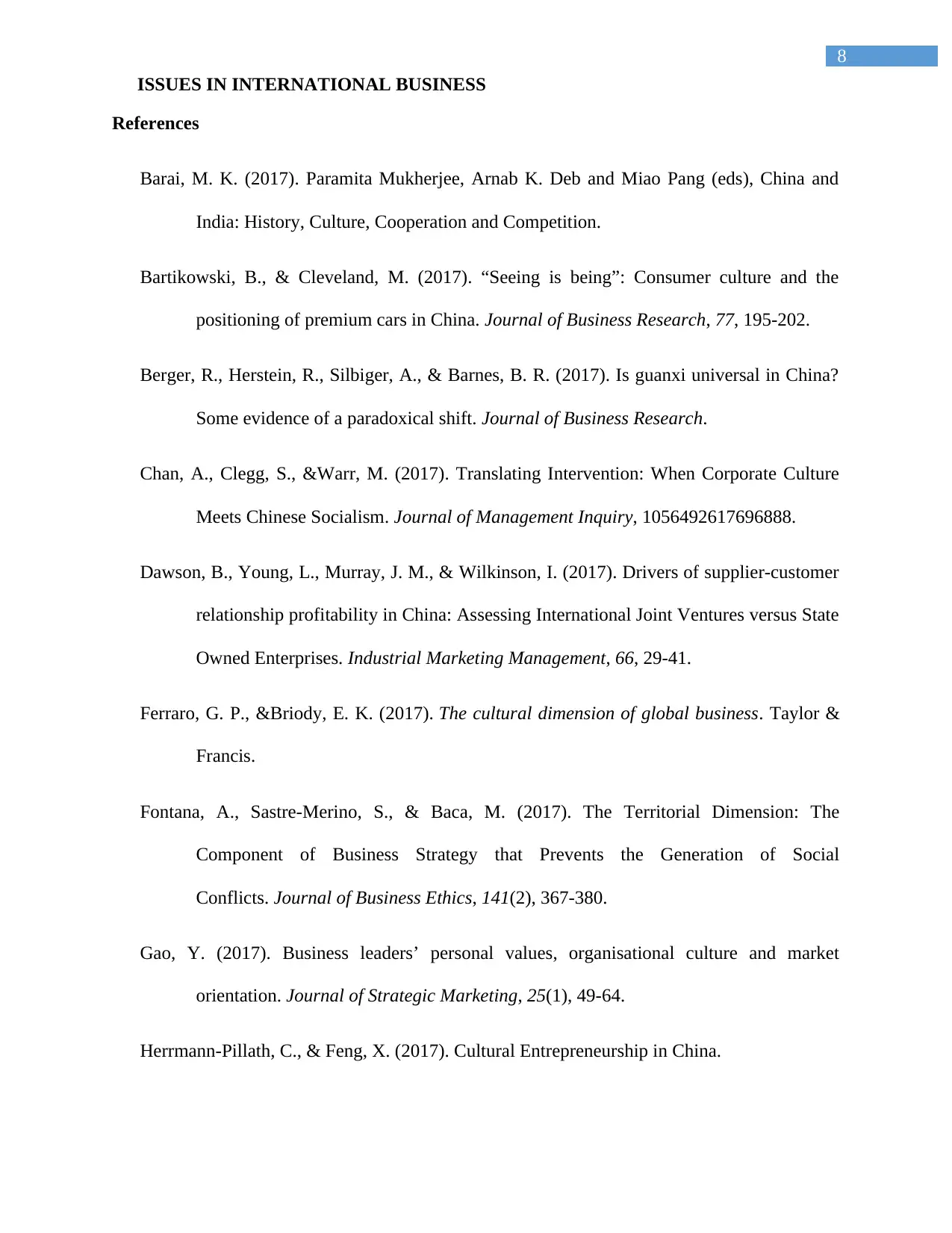
8
ISSUES IN INTERNATIONAL BUSINESS
References
Barai, M. K. (2017). Paramita Mukherjee, Arnab K. Deb and Miao Pang (eds), China and
India: History, Culture, Cooperation and Competition.
Bartikowski, B., & Cleveland, M. (2017). “Seeing is being”: Consumer culture and the
positioning of premium cars in China. Journal of Business Research, 77, 195-202.
Berger, R., Herstein, R., Silbiger, A., & Barnes, B. R. (2017). Is guanxi universal in China?
Some evidence of a paradoxical shift. Journal of Business Research.
Chan, A., Clegg, S., &Warr, M. (2017). Translating Intervention: When Corporate Culture
Meets Chinese Socialism. Journal of Management Inquiry, 1056492617696888.
Dawson, B., Young, L., Murray, J. M., & Wilkinson, I. (2017). Drivers of supplier-customer
relationship profitability in China: Assessing International Joint Ventures versus State
Owned Enterprises. Industrial Marketing Management, 66, 29-41.
Ferraro, G. P., &Briody, E. K. (2017). The cultural dimension of global business. Taylor &
Francis.
Fontana, A., Sastre-Merino, S., & Baca, M. (2017). The Territorial Dimension: The
Component of Business Strategy that Prevents the Generation of Social
Conflicts. Journal of Business Ethics, 141(2), 367-380.
Gao, Y. (2017). Business leaders’ personal values, organisational culture and market
orientation. Journal of Strategic Marketing, 25(1), 49-64.
Herrmann-Pillath, C., & Feng, X. (2017). Cultural Entrepreneurship in China.
ISSUES IN INTERNATIONAL BUSINESS
References
Barai, M. K. (2017). Paramita Mukherjee, Arnab K. Deb and Miao Pang (eds), China and
India: History, Culture, Cooperation and Competition.
Bartikowski, B., & Cleveland, M. (2017). “Seeing is being”: Consumer culture and the
positioning of premium cars in China. Journal of Business Research, 77, 195-202.
Berger, R., Herstein, R., Silbiger, A., & Barnes, B. R. (2017). Is guanxi universal in China?
Some evidence of a paradoxical shift. Journal of Business Research.
Chan, A., Clegg, S., &Warr, M. (2017). Translating Intervention: When Corporate Culture
Meets Chinese Socialism. Journal of Management Inquiry, 1056492617696888.
Dawson, B., Young, L., Murray, J. M., & Wilkinson, I. (2017). Drivers of supplier-customer
relationship profitability in China: Assessing International Joint Ventures versus State
Owned Enterprises. Industrial Marketing Management, 66, 29-41.
Ferraro, G. P., &Briody, E. K. (2017). The cultural dimension of global business. Taylor &
Francis.
Fontana, A., Sastre-Merino, S., & Baca, M. (2017). The Territorial Dimension: The
Component of Business Strategy that Prevents the Generation of Social
Conflicts. Journal of Business Ethics, 141(2), 367-380.
Gao, Y. (2017). Business leaders’ personal values, organisational culture and market
orientation. Journal of Strategic Marketing, 25(1), 49-64.
Herrmann-Pillath, C., & Feng, X. (2017). Cultural Entrepreneurship in China.
⊘ This is a preview!⊘
Do you want full access?
Subscribe today to unlock all pages.

Trusted by 1+ million students worldwide
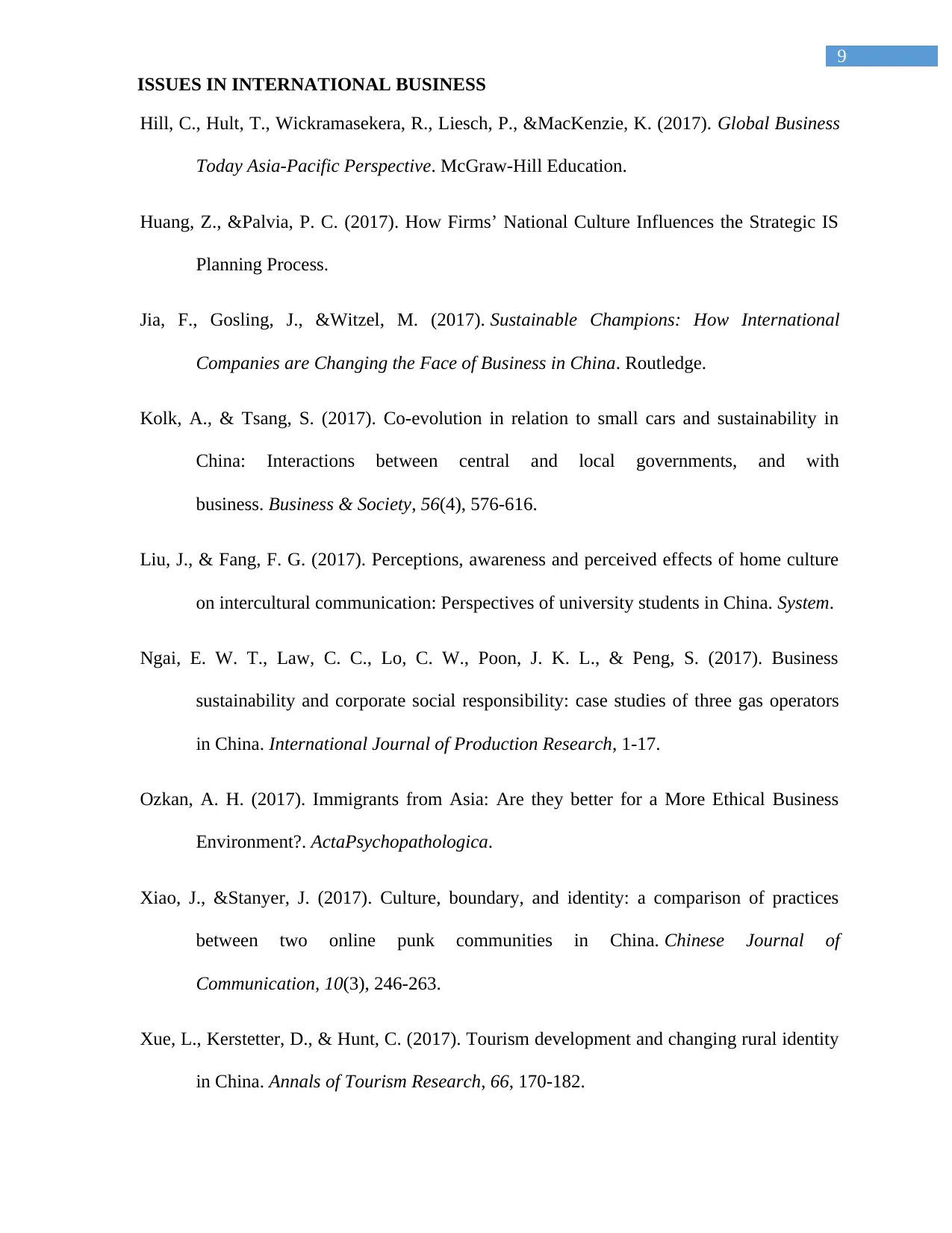
9
ISSUES IN INTERNATIONAL BUSINESS
Hill, C., Hult, T., Wickramasekera, R., Liesch, P., &MacKenzie, K. (2017). Global Business
Today Asia-Pacific Perspective. McGraw-Hill Education.
Huang, Z., &Palvia, P. C. (2017). How Firms’ National Culture Influences the Strategic IS
Planning Process.
Jia, F., Gosling, J., &Witzel, M. (2017). Sustainable Champions: How International
Companies are Changing the Face of Business in China. Routledge.
Kolk, A., & Tsang, S. (2017). Co-evolution in relation to small cars and sustainability in
China: Interactions between central and local governments, and with
business. Business & Society, 56(4), 576-616.
Liu, J., & Fang, F. G. (2017). Perceptions, awareness and perceived effects of home culture
on intercultural communication: Perspectives of university students in China. System.
Ngai, E. W. T., Law, C. C., Lo, C. W., Poon, J. K. L., & Peng, S. (2017). Business
sustainability and corporate social responsibility: case studies of three gas operators
in China. International Journal of Production Research, 1-17.
Ozkan, A. H. (2017). Immigrants from Asia: Are they better for a More Ethical Business
Environment?. ActaPsychopathologica.
Xiao, J., &Stanyer, J. (2017). Culture, boundary, and identity: a comparison of practices
between two online punk communities in China. Chinese Journal of
Communication, 10(3), 246-263.
Xue, L., Kerstetter, D., & Hunt, C. (2017). Tourism development and changing rural identity
in China. Annals of Tourism Research, 66, 170-182.
ISSUES IN INTERNATIONAL BUSINESS
Hill, C., Hult, T., Wickramasekera, R., Liesch, P., &MacKenzie, K. (2017). Global Business
Today Asia-Pacific Perspective. McGraw-Hill Education.
Huang, Z., &Palvia, P. C. (2017). How Firms’ National Culture Influences the Strategic IS
Planning Process.
Jia, F., Gosling, J., &Witzel, M. (2017). Sustainable Champions: How International
Companies are Changing the Face of Business in China. Routledge.
Kolk, A., & Tsang, S. (2017). Co-evolution in relation to small cars and sustainability in
China: Interactions between central and local governments, and with
business. Business & Society, 56(4), 576-616.
Liu, J., & Fang, F. G. (2017). Perceptions, awareness and perceived effects of home culture
on intercultural communication: Perspectives of university students in China. System.
Ngai, E. W. T., Law, C. C., Lo, C. W., Poon, J. K. L., & Peng, S. (2017). Business
sustainability and corporate social responsibility: case studies of three gas operators
in China. International Journal of Production Research, 1-17.
Ozkan, A. H. (2017). Immigrants from Asia: Are they better for a More Ethical Business
Environment?. ActaPsychopathologica.
Xiao, J., &Stanyer, J. (2017). Culture, boundary, and identity: a comparison of practices
between two online punk communities in China. Chinese Journal of
Communication, 10(3), 246-263.
Xue, L., Kerstetter, D., & Hunt, C. (2017). Tourism development and changing rural identity
in China. Annals of Tourism Research, 66, 170-182.
1 out of 10
Related Documents
Your All-in-One AI-Powered Toolkit for Academic Success.
+13062052269
info@desklib.com
Available 24*7 on WhatsApp / Email
![[object Object]](/_next/static/media/star-bottom.7253800d.svg)
Unlock your academic potential
Copyright © 2020–2026 A2Z Services. All Rights Reserved. Developed and managed by ZUCOL.





